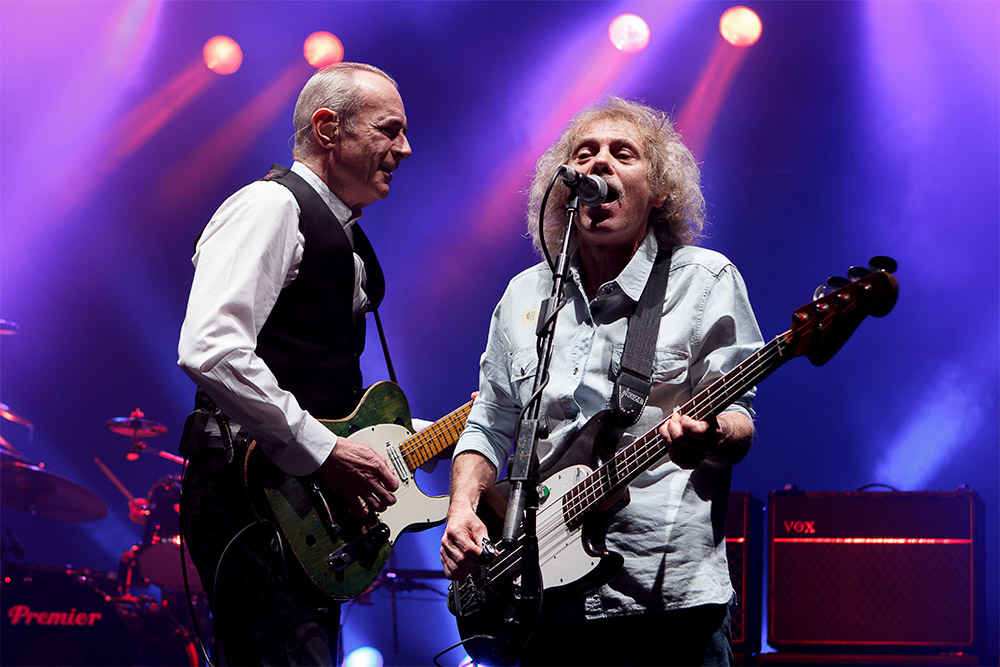
From School Friends to Rock Legends: The Evolution of Status Quo
In the world of rock music, where bands come and go with the shifting tides of popular taste, few have shown the staying power and evolution of Status Quo. What began as a casual musical partnership between two schoolboys in 1962 eventually transformed into one of the most enduring rock bands in British music history. The journey of Francis Rossi and Alan Lancaster from school friends to the founding members of Status Quo is a story of persistence, reinvention, and unwavering passion for music.
Francis Rossi and Alan Lancaster met at Sedgehill Comprehensive School in London. Like many teenagers during the early 1960s, they were swept up by the wave of excitement surrounding the explosion of rock and roll, particularly inspired by bands like The Beatles and The Shadows. The pair’s mutual love for music led them to form a band called The Scorpions in 1962. Though still in their early teens, they were already dreaming of a future in music.
The Scorpions began performing at school events and local venues, slowly gaining experience and refining their sound. The early days were humble, marked by homemade instruments and second-hand gear, but the band’s enthusiasm was undeniable. By 1965, the group had undergone several lineup changes and rebranded themselves as The Spectres. Their music leaned more towards psychedelic pop and beat music, which was in vogue at the time.
As The Spectres, they began to take their ambitions more seriously. They signed a record deal and released several singles, though commercial success initially eluded them. Despite the lack of chart impact, Rossi and Lancaster remained committed. They continued to experiment with their sound and adapt to the changing musical landscape.
In 1967, the band changed its name once again, this time to Traffic Jam. The name, however, soon led to confusion due to the emergence of another band called Traffic, which featured Steve Winwood. To avoid further conflict and carve a distinct identity, the group made one final name change. In 1969, they settled on Status Quo, a name that would eventually become synonymous with hard-hitting, no-nonsense rock and roll.
Status Quo’s transformation was not limited to their name. Musically, they underwent a significant shift from psychedelic pop to a heavier, boogie rock sound. This change in style proved to be the breakthrough they needed. Their 1972 album Piledriver marked the true beginning of the classic Status Quo sound—characterized by driving rhythms, blues-influenced guitar riffs, and straightforward rock energy. The album was a commercial success and established the band as a force in the British rock scene.
Throughout the 1970s and early 1980s, Status Quo released a string of hit albums and singles. Songs like “Caroline,” “Down Down,” “Whatever You Want,” and “Rockin’ All Over the World” became anthems for a generation of rock fans. Their relentless touring schedule and energetic live performances earned them a reputation as one of the hardest-working bands in the business.
What set Status Quo apart was their commitment to their sound and identity. While trends in music evolved—from glam rock to punk to new wave—Status Quo remained true to their straightforward rock roots. This consistency may have led some critics to label them as formulaic, but it also earned them a devoted fan base that appreciated their no-frills approach to music.
Despite lineup changes over the years, Francis Rossi remained the band’s frontman and guiding force. Alan Lancaster, who co-founded the band and played bass, was an integral part of the group until his departure in the mid-1980s. Though the parting was not entirely amicable, Lancaster’s role in the band’s rise to prominence is indisputable. He later reunited with the group for special reunion tours, including the “Frantic Four” lineup tours in the 2010s, which were met with widespread acclaim from fans and critics alike.
Status Quo’s legacy extends beyond their chart success. With over 100 singles, more than 30 albums, and over 118 million records sold worldwide, they became one of the best-selling bands in British music history. Their appearance at Live Aid in 1985, where they opened the concert with “Rockin’ All Over the World,” solidified their place in rock history. It was a moment that brought their music to a global audience and demonstrated their status as rock icons.
Even as musical landscapes continued to shift in the late 20th and early 21st centuries, Status Quo endured. They adapted without abandoning their identity, continuing to tour and record new material well into the 2010s and beyond. Their longevity is a testament not just to their talent but to their determination and resilience.
The story of Status Quo is more than just a tale of rock success. It’s a reflection of what happens when youthful passion meets perseverance. From school performances under the name Scorpions to international rock stardom as Status Quo, Francis Rossi and Alan Lancaster laid the foundation for a band that would leave an indelible mark on the world of music. Their evolution, marked by reinvention and rooted in a deep love for rock and roll, remains an inspiring journey for aspiring musicians everywhere.
Leave a Reply